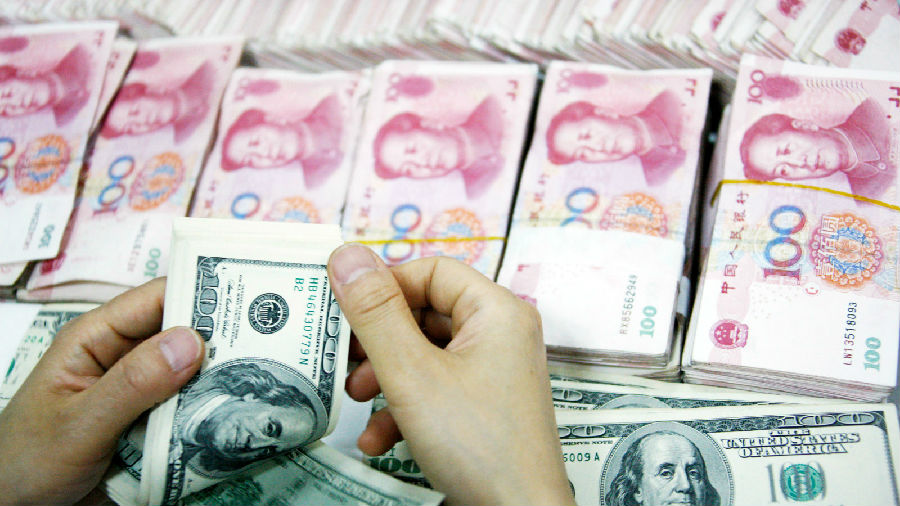China’s hopes of achieving global acceptance for the renminbi have been set back by data showing the share of international transactions in its currency at its lowest level in more than three and a half years.
中国对人民币获得全球认可的希望遭遇挫折,数据显示人民币在国际交易中的份额降至逾三年半以来最低水平。
Data from the Swift global bank payment messaging network showed the share falling from 1.85 per cent in September to just 1.46 per cent last month, its lowest level since April 2014.
环球银行金融电信协会(SWIFT)全球银行支付信息网络的数据显示,人民币在国际交易中的份额从9月份的1.85%下降到10月的1.46%,为2014年4月以来的最低水平。
That means the currency’s share has nearly halved since its peak in 2015.
这意味着人民币所占份额自2015年见顶以来几乎减半。
Markets had expected its global share to continue rising after the renminbi last year became the fifth currency to be added to the International Monetary Fund’s special drawing rights basket, joining the dollar, euro, yen and pound.
市场此前预计,继去年人民币成为第五种被纳入国际货币基金组织(IMF)特别提款权篮子的货币,加入美元、欧元、日元和英镑的行列后,其全球份额将继续攀升。
The renminbi’s admission was conditional on China becoming more transparent and opening its financial markets. The MSCI’s inclusion next year of China’s A-shares in its global indices continues this trend. China has also been opening its fixed income markets to foreign investors.
人民币入篮的条件是中国变得更加透明,并开放金融市场。MSCI明晟明年把中国A股纳入其全球指数将延续这一趋势。中国也在向外国投资者开放其固定收益市场。
In spite of these measures and talk of internationalisation, “the reality is that the yuan is becoming less relevant in the international arena”, said Sue Trinh of RBC Capital Markets.
尽管有这些措施和国际化的言论,但“现实是人民币在国际舞台上变得越来越不相关了,”加拿大皇家银行资本市场(RBC Capital Markets)的Sue Trinh表示。
The reason, she added, was down to “heavy-handed intervention across the financial markets” that has eroded the renminbi’s international appeal.
她补充说,原因在于“对各个金融市场的高压干预”侵蚀了人民币的国际吸引力。
China is weighed down by numerous and conflicting priorities, said Kit Juckes at Société Générale.
法国兴业银行(Société Générale)的基特?朱克斯(Kit Juckes)表示,中国被大量且互相冲突的优先事项拖累了。
“Beijing is trying to control capital flows, contain the shadow banking system and prevent a debt crisis, make sure the economy continues to grow, contain a pollution crisis, and promote the internationalisation of the currency,” Mr Juckes said. “That’s a lot of priorities which can’t all be achieved at the same time.”
朱克斯说:“北京正试图控制资本流动,抑制影子银行体系,防止债务危机,确保经济持续增长,遏制污染危机,以及促进人民币国际化。这是一大堆优先事项,不可能同时实现。 “
But its success in slowing capital outflows had helped stem declines in its currency reserves and increased the authorities’ control over the renminbi’s value, Mr Juckes added. “A temporary decrease in its use in global payments is probably a price worth paying.”
朱克斯表示,但中国在减缓资本流出方面的成功已经帮助阻止外汇储备下滑,并加强了当局对人民币价值的控制。 “全球支付使用量暂时下降很可能是一个值得付出的代价。”

The start of the renminbi’s loss of market share coincided with worries about China’s slowdown in August 2015, which triggered the renminbi’s devaluation, followed by another scare in January 2016, said Simon Derrick of BNY Mellon.
纽约梅隆银行(BNY Mellon)的西蒙?德里克(Simon Derrick)表示,人民币开始失去市场份额的时间,恰好是2015年8月人们开始担忧中国经济放缓之时,当时这方面的担忧引发了人民币贬值,2016年1月的又一次恐慌再次引发人民币贬值。
“The decline seen over the past few months is even more interesting, given the lack of any obvious pressures in the renminbi market. Have we missed something?” added Mr Derrick.
德里克说:“鉴于人民币市场并无任何明显压力,过去几个月的下降更有意思。我们错过了什么吗?”
The renminbi is now only the seventh most traded currency internationally, behind the Canadian dollar and just above the Australian dollar.
人民币现在跌回全球第七大交易货币,排在加元之后,澳元之前。
The US dollar leads the way, with 39.47 per cent, followed by the euro (33.98 per cent), sterling (7.71 per cent), the Japanese yen (2.92 per cent) and the Swiss franc (1.63 per cent).
美元以39.47%排在第一位,其次是欧元(33.98%)、英镑(7.71%)、日元(2.92%)和瑞士法郎(1.63%)。
The euro was the biggest gainer in the latest data, up 1 per cent on the previous month, while the dollar was down 0.3 per cent.
最新数据显示欧元份额升幅最大,比前一个月上升1%,而美元份额下降了0.3%。













